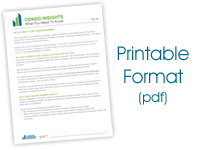The condominium lifestyle, by nature, means people live close to each other. “Being a good neighbour” to one person may mean something completely different to another; which is why there are rules.
Rules are meant to create order, not oppression. Without them, some residents may “do their own thing,” which may be offensive to other residents.
This is where the board and your ACMS Consultant come in. The board is responsible to create the rules for the community. Your condominium management company is there to help enforce them. Putting the right framework in place can help create harmony. Too few rules result in anarchy, and too many start to feel onerous to residents.
Achieving the right balance in your rule-making will protect the value of your community and encourage a feeling of goodwill among residents. We’ve put together some guidelines to help you do that.
- Lead with common sense, not emotion, when you make rules. Rules should be created only when it’s absolutely necessary. Aim to balance protection of freedom with preservation of home values and resident safety. Take care to ensure your rule doesn’t unreasonably limit residents’ activities.
- Clean and simple. Focus on creating rules that are clear and easy to follow. The intent should be to make compliance easy. Residents should be able to adhere to and meet the standards of all rules.
- Communication is paramount. It is important to make people aware of the rules so they can adapt to them. This is particularly important with new rules. If residents are not aware of the policies, they will not be able to follow them.
- Evaluate the rules. Review the rules regularly to make sure they are still relevant to the current environment. If circumstances have changed, either update the rule to address this, or eliminate it if it no longer makes sense.
- Enforce the rules consistently. Random enforcement of a rule is an excellent way to ensure residents will disregard it. The rules apply to everyone, board and residents alike…usually (see item 6, below).
- There will be exceptions. It is impossible to create a rule that will apply to every situation. Examine the facts and be fair if legitimate reasons exist to be lenient.
- If a rule is broken, act quickly – but be reasonable. Advise the resident who is non-compliant, with proper notice of his or her infraction. Provide a clear description of the consequences should the action or behaviour continue. Listen objectively to the resident’s side of the story. Obviously coming to a mutual agreement is the desired outcome, but if that is not possible, both sides have the option of choosing mediation or legal solutions. Your condominium management company has the experience to help the board enforce the rules the right way.
- Every rule should achieve a goal. Don’t fall into the trap of making rules for the sake of making rules. Each rule the board creates must address a real concern and provide a solution. If you approach rule-making with this in mind, you’ll avoid unreasonable rules and those that are the result of political pressure.
- Refrain from extreme reaction. Avoid acting impulsively when there’s a problem. Each situation is unique. Focus on understanding and perspective when enforcement is required. It may be tempting to inflict heavy penalties for minor infractions, but this is rarely a good idea. Be reasonable and impartial when evaluating situations; open to making exceptions should the situation warrant it.
- Reject anonymous communication. Sometimes you will receive complaints that come from unverified sources or from a source that does not identify itself. Ignore them. A credible complaint will come from a person who is willing to stand behind it.
- Be sure your rule is a solution, not another problem. If your rule results in a bigger mess than what you started with, then it’s not a good rule.
Rules are meant to work for, not against, your community. Consider these tips when you are formulating your rules and policies and you’ll see good rules strengthen an association, not limit it.



